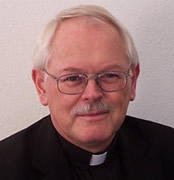
There are different ways of being excluded in life.
Earlier this year, one of my older brothers died. By every indication he had lived an exemplary life, one lived mainly for others. He died much loved by everyone who knew him. His was a life lived for family, church, community, and friends.
Giving the homily at his funeral, I shared that, while he almost always brought a smile, a graciousness, and some wit to every situation, underneath he sometimes had to swallow hard to always do that. Why? Because, even though through his entire adult life he gave himself to serving others, for much of his life he didn’t have much choice in the matter. Here’s his story.
He was one of the older children in our family, a large second-generation immigrant family, struggling with poverty in an isolated rural area of the Canadian prairies where educational facilities weren’t easily available at that time. So, for him, as for many of his contemporaries, both men and women, the normal expectation was that after elementary school (an eighth-grade education) you were expected to end your school days and begin to work to support your family. Indeed, when he graduated from elementary school, there was no local high school for him to go to. Making this more unfortunate, he was perhaps the brightest, most gifted mind in our family. It’s not that he didn’t want to continue his formal education. But, he had to do what most others of his age did at that time, leave school and begin working, giving your entire salary over every month to support your family. He did this with good cheer, knowing this was expected of him.
Through the years, from age sixteen when he first entered the work force until he took over the family farm in his mid-thirties, he worked for farmers, worked in construction, and did everything from operating a backhoe to driving a truck. Moreover, when our parents died and he took over our farm, there were a number of years when he was still pressured to use the farm to support the family. By the time he was finally freed of this responsibility, it was too late (not radically, but existentially) for him to restart his formal education. He lived out his final years before retirement as a farmer, though as one who found his energy elsewhere, in involvement in ongoing education and lay ministries programs where he thrived emotionally and intellectually. Part of his sacrifice too was that he never married, not because he was a temperamental bachelor, but because the same things that bound him to duty also, existentially, never afforded him the opportunity to marry.
After I shared his story at his funeral, I was approached by several people who said: That’s also my brother! That’s also my sister! That was my dad! That was my mother.
Having grown up where this was true of a number of my older siblings, today, whenever I see people working in service jobs such as cooking in cafeterias, cleaning houses, mowing lawns, working in construction, doing janitorial work, and other work of this kind, I am often left to wonder, are they like my brother? Did they get to choose this work or are they doing it because of circumstances? Did this person want to be a doctor, or writer, a teacher, an entrepreneur, or a CEO of some company, and end up having to take this job because of an economic or other circumstance? Don’t get me wrong. There’s nothing demeaning or less-than-noble in these jobs. Indeed, working with your hands is perhaps the most honest work of all – unlike my own work within the academic community where it can be easy to be self-serving and mostly irrelevant. There’s a wonderful dignity in working with your hands, as there was for my brother. However, the importance and dignity of that work notwithstanding, the happiness of the person doing it is sometimes predicated on whether or not he or she had a choice, that is, whether or not he or she is there by choice or because factors ranging from the economic situation of their family, to their immigrant status, to lack of opportunity, have forced them there.
As I walk past these folks in my day-to-day life and work, I try to notice them and appreciate the service they are rendering for the rest of us. And sometimes I say to myself: This could be my bother. This could be my sister. This could be the brightest mind of all who was not given the opportunity to become a doctor, a writer, nurse, a teacher, or a social worker.
If in the next life, as Jesus promised, there’s to be a reversal where the last shall be first, I hope these people, like my brother, who were deprived of some of the opportunities that the rest of us enjoyed, will read my heart with an empathy that surpasses my understanding of them during their lifetime.
——-
Oblate Father Ron Rolheiser is a theologian, teacher, and award-winning author. He can be contacted through his website www.ronrolheiser.com.
Now on Facebook www.facebook.com/ronrolheiser
Feature image courtesy CNS photo/Jonathan Ernst, Reuters























A great article! Thanks again for including Rolheiser!